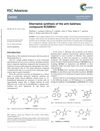 48 citations,
September 2017 in “Frontiers in Bioscience”
48 citations,
September 2017 in “Frontiers in Bioscience” Nanoparticles show promise for better wound healing, but more research is needed to ensure safety and effectiveness.
 13 citations,
December 2013 in “Chemistry Central Journal”
13 citations,
December 2013 in “Chemistry Central Journal” Sunlight exposure increases drug toxicity; amber glass best for protection.
December 2023 in “Animals” The study mapped yak skin cells to understand hair growth better.
 1 citations,
January 2021 in “Journal of biological chemistry/The Journal of biological chemistry”
1 citations,
January 2021 in “Journal of biological chemistry/The Journal of biological chemistry” FLCN helps control iron levels in cells.
33 citations,
October 2013 in “PloS one” Human sweat glands have a type of stem cell that can grow well and turn into different cell types.
4 citations,
February 2023 in “Frontiers in Oncology” Nano-Pulse Stimulation™ Therapy is more effective and less damaging than cryoablation for treating melanoma tumors in mice.
 28 citations,
August 2015 in “Journal of Drug Targeting”
28 citations,
August 2015 in “Journal of Drug Targeting” The new CoQ10 gel protects mouse skin better against aging from UV light than the old gel.
 January 2023 in “Fashion and textiles”
January 2023 in “Fashion and textiles” Cationic and nonionic surfactants provide better color intensity and resistance for semi-permanent hair dye than anionic surfactants.
69 citations,
January 2002 in “Journal of biomedical optics” Dyes can penetrate human skin and hair follicles up to 1.2 mm deep and the sebaceous gland can store dye; Indocyanine Green lotion was made for safe dyeing and monitoring.
660 citations,
December 2011 in “Cell” Different hair follicles in the skin are innervated by unique combinations of mechanosensory neurons, crucial for touch sensation.
 75 citations,
January 2014 in “Archiv Der Pharmazie”
75 citations,
January 2014 in “Archiv Der Pharmazie” Jasmonic acid and its derivatives play important roles in plant health and have potential uses in medicine and agriculture.
 4 citations,
January 2014 in “RSC Advances”
4 citations,
January 2014 in “RSC Advances” A new, less toxic and more efficient method to create the anti-baldness compound RU58841 was developed in 2014.
 January 2025 in “Medicina”
January 2025 in “Medicina” Advanced techniques and technologies can improve burn wound healing, but more research is needed.
 53 citations,
May 2001 in “The American journal of the medical sciences”
53 citations,
May 2001 in “The American journal of the medical sciences” Chemotherapy can cause various skin problems, and recognizing them helps improve patient care.
 November 2024 in “Journal of Translational Internal Medicine”
November 2024 in “Journal of Translational Internal Medicine” Exosomes from stem cells help hair regrowth by activating a specific signaling pathway.
 61 citations,
May 2014 in “International journal of pharmaceutics”
61 citations,
May 2014 in “International journal of pharmaceutics” Nanocrystals improve skin penetration and stability of caffeine, suggesting a new method for delivering similar substances through the skin.
 4 citations,
August 2022 in “Lasers in medical science”
4 citations,
August 2022 in “Lasers in medical science” Both 1565-nm laser and 1064-nm laser safely and effectively reduce enlarged facial pores, with the 1064-nm laser causing fewer side effects.
 March 2024 in “Nutrients”
March 2024 in “Nutrients” Gynostemma pentaphyllum and its component damulin B could help hair grow by activating certain cell pathways.
 July 2024 in “International Journal of Advanced Research in Science Communication and Technology”
July 2024 in “International Journal of Advanced Research in Science Communication and Technology” Hibiscus micranthus leaf extract is safe and effective for antibacterial and wound healing.
 20 citations,
December 2016 in “American Journal of Clinical Dermatology”
20 citations,
December 2016 in “American Journal of Clinical Dermatology” Men prefer less invasive cosmetic procedures and need different treatment approaches than women.
 15 citations,
February 2018 in “Journal of Cosmetic and Laser Therapy”
15 citations,
February 2018 in “Journal of Cosmetic and Laser Therapy” Laser-assisted drug delivery improves hair loss.
 9 citations,
March 2022 in “Journal of radiation research”
9 citations,
March 2022 in “Journal of radiation research” Boron neutron capture therapy for head and neck cancer can cause side effects like mouth sores and skin irritation, which vary depending on where the treatment is aimed.
 138 citations,
February 2007 in “European journal of cancer”
138 citations,
February 2007 in “European journal of cancer” EGFR inhibitors often cause skin problems and other side effects, but these are usually reversible and can be managed to keep patients comfortable.

Elastin-like recombinamers show promise for better wound healing and skin regeneration.
 47 citations,
January 2019 in “Nature communications”
47 citations,
January 2019 in “Nature communications” Polyamines help fix DNA damage accurately in cells.
182 citations,
November 2018 in “Cosmetics” Seaweeds have beneficial compounds for skin care, including anti-aging and protective effects.

Umbilical cord blood is a valuable source of stem cells for medical treatments, but its use is less common than other transplants, and there are ethical issues to consider.
127 citations,
August 2016 in “The oncologist” Understanding and managing side effects of hedgehog pathway inhibitors can improve treatment for advanced basal cell carcinoma.
 92 citations,
January 1999 in “Physics in Medicine and Biology”
92 citations,
January 1999 in “Physics in Medicine and Biology” Skin can be cooled quickly and safely during laser treatments to protect it without affecting deeper layers.
 2 citations,
February 2023 in “BJUI”
2 citations,
February 2023 in “BJUI” Urologists should monitor mental health in patients taking finasteride due to potential links to suicidal thoughts, adjusting dosage or stopping use if necessary. More research is needed to confirm if finasteride causes these thoughts.























